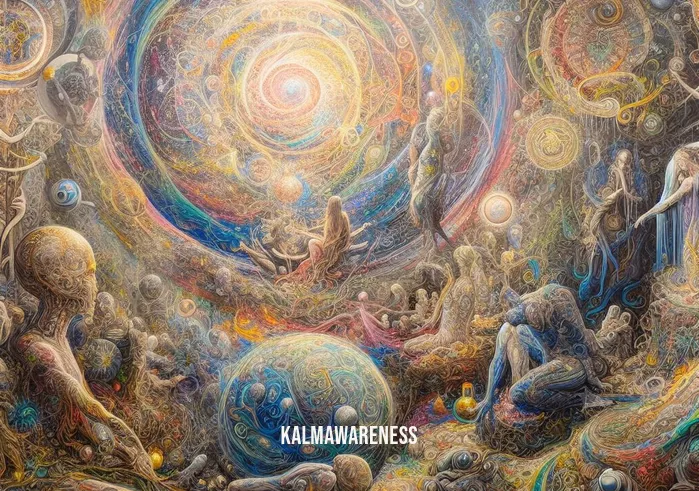Meditation on Acceptance: A Journey Towards Inner Freedom and Self-Compassion
Embracing the Practice of Acceptance
One of the fundamental tenets of mindfulness and meditation is the concept of acceptance. Acceptance isn’t about resignation or complacency; it is about embracing reality as it is, without trying to change, control, or deny it. The practice of meditation on acceptance invites us to witness our experiences—whether they’re pleasant or unpleasant—without judgement or resistance.
The road to acceptance can be challenging, especially when we’re confronted with difficult situations or uncomfortable feelings. We often struggle with insecurities, fear, and heartbreak, trying to push these feelings away rather than fully experiencing them. For instance, meditation for insecurity and meditation for a broken heart are designed to help us confront these emotions and process them in a healthy manner.
“Acceptance is not about liking a situation. It is about acknowledging all parts of reality and choosing to let them be there without trying to change them.” – Tara Brach
Techniques to Cultivate Acceptance
Acceptance, like any other skill, needs to be cultivated and nurtured. One powerful tool at our disposal is the practice of letting go meditation. This practice allows us to release the emotional cords that hold us to past experiences, people, or perceptions that no longer serve us. Through the act of letting go, we create space for new experiences and insights to emerge.
Another powerful practice is the compassionate body scan, a technique that teaches us to approach our bodies with kindness and understanding. Often, our bodies hold onto emotional pain in the form of tension or discomfort. A compassionate body scan can help us become aware of these physical sensations and meet them with acceptance and care.
The Power of Acceptance in Difficult Times
In times of suffering or distress, acceptance becomes even more critical. Whether we’re navigating feelings of sadness, dealing with heartbreak, or facing fear, the practice of acceptance can serve as a lifeline. Techniques like sadness meditation and releasing fear meditation can help us to sit with these emotions and accept them as part of our human experience. Acceptance doesn’t necessarily make these feelings disappear, but it allows us to face them without resistance, thus reducing their impact and hold on us.
“The curious paradox is that when I accept myself just as I am, then I can change.” – Carl Rogers
Join us in the next part of this article where we will delve deeper into the transformative power of acceptance, exploring the relationship between acceptance and self-compassion, and how the practice of acceptance can lead to inner freedom. You will also find a range of practices that can help you incorporate the power of acceptance into your daily life. ✨
–
The Transformative Power of Acceptance
Acceptance and Self-Compassion
The journey of meditation on acceptance intertwines closely with the path of self-compassion. In fact, acceptance is a cornerstone of self-compassion. It allows us to extend kindness towards ourselves, especially when we are going through pain or facing personal shortcomings. In this context, acceptance is about embracing all aspects of ourselves, the good and the not so good.
Practices like the self-compassion for men and befriending your body meditations provide frameworks for cultivating self-compassion through acceptance. As we practice acceptance, we learn to meet ourselves where we are without judgement or criticism.
“What we resist persists. But, if we accept the reality of our situation, we can find freedom in the midst of the seeming confines.” – Tara Brach
Self-compassion, through the lens of acceptance, acknowledges that we are human and imperfect. Acceptance does not mean resignation. Instead, it means to stop fighting reality and start working with it. It’s acknowledging our menstrual cramp or our struggles with depression, and treating ourselves with kindness as we navigate these challenges.
Acceptance and Inner Freedom
Acceptance is the key that unlocks the door to inner freedom. It provides us with the ability to transcend our challenges and see them for what they are: transient experiences that do not define us. This understanding fosters a sense of freedom, even in the midst of hardship.
Meditations like the always comfortable and inner child healing exercises aid in cultivating this sense of freedom. They teach us to care for ourselves with love and respect, building a foundation of acceptance that leads to inner peace.
When we meditate on acceptance, we practice seeing our experiences without the lens of judgement. We learn to notice our thoughts and feelings, even those we may find uncomfortable, without letting them dictate our responses.
Practices for Cultivating Acceptance
Meditation on acceptance can be cultivated through various practices that foster mindfulness and presence. Here are a few practices you can incorporate into your routine:
- Mindful Breathing: This is a fundamental practice that forms the bedrock of most meditation techniques. The focus on breath brings attention to the present moment and fosters acceptance of our current state of being.
- Guided Meditations: There are numerous guided meditations available that focus on cultivating acceptance, such as the cloud meditation or morning grounding meditation. These provide structured practices that can be incredibly helpful, especially for beginners.
- Body Scan: This involves paying attention to different parts of the body without judgement. It’s an exercise in acceptance of our physical presence and any sensations that may arise.
- Loving-Kindness Meditation: This practice involves directing feelings of compassion and love towards ourselves and others. It is a powerful way to cultivate acceptance and understanding.
“The more you know yourself, the more patience you have for what you see in others.” – Erik Erikson
Join us in the next part of this article where we will explore the impact of meditation on acceptance in our daily lives, learn about the potential obstacles on the path of acceptance, and how we can navigate them. We’ll also dive deeper into more practices to cultivate acceptance.
–
The Impact of Meditation on Acceptance in Our Daily Lives
As we dive deeper into the process of meditation on acceptance, the effects of this transformative practice begin to permeate our daily lives. It opens the doorway to a more mindful, compassionate, and resilient approach to life’s ups and downs.
Acceptance is not about dismissing our feelings or ignoring problems; it’s about creating space for those experiences without being overwhelmed by them. This can be particularly helpful when we face challenges such as insecurity, heartbreak, or fear.
Our meditation for insecurity and meditation for a broken heart focus on bringing these often uncomfortable feelings to the forefront, acknowledging their presence, and accepting them without judgement. Similarly, the releasing fear meditation script teaches us to confront fear, understand its source, and accept its transient nature.
“What lies behind us and what lies before us are tiny matters compared to what lies within us.” – Ralph Waldo Emerson
This acceptance enables us to move through life with greater ease, reducing the inner resistance that often amplifies our suffering. For example, acceptance can assist us in navigating the physical and emotional discomforts of menopause, as outlined in our menopause meditation.
Navigating Obstacles to Acceptance
On our journey towards acceptance, we may encounter a number of obstacles. These can include deeply ingrained beliefs, fear of vulnerability, and resistance to change.
Our cord cutting meditation and cord cutting meditation script offer techniques to let go of these limiting beliefs and attachments, fostering an environment of acceptance. Similarly, the practice of auto-compasion helps us to embrace our vulnerabilities and accept ourselves fully, warts and all.
The most challenging obstacle to acceptance may be the resistance to change, particularly when the change is perceived as negative or difficult. Our into anguish meditation encourages us to embrace this change and the feelings it brings, and to view it as a transformative opportunity rather than a threat.
More Practices to Cultivate Acceptance
Cultivating acceptance is an ongoing process. Here are additional practices to consider:
- Journaling: Writing about your thoughts and feelings can help cultivate acceptance. It allows you to express your emotions freely and without judgement, fostering a sense of acceptance and self-understanding.
- Mindful Walking: This involves walking slowly and deliberately, fully aware of each step and the sensations in your body. It can be a powerful practice of acceptance, as it teaches you to be present and accepting of your experience in each moment.
- Letting Go Meditations: These practices, such as the clear the clutter meditation, are focused on releasing attachments, resentments, and unhelpful beliefs, clearing the path for acceptance to take root.
“The curious paradox is that when I accept myself just as I am, then I can change.” – Carl Rogers
Join us in the next chapter where we’ll explore the benefits of meditation on acceptance, from boosting emotional resilience to promoting physical health. We’ll also delve into how acceptance interlinks with other core concepts in mindfulness, and how it can be applied in different areas of our lives.
–
The Benefits of Meditation on Acceptance
The practice of meditation on acceptance can greatly influence our psychological and physical health, serving as a potent tool for personal transformation.
Psychologically, acceptance helps us navigate through various emotions more efficiently. By understanding and accepting our feelings, we’re less likely to get stuck in negative thought patterns, which can often lead to distress and anxiety. For example, our sadness meditation offers a safe space to sit with and accept our sadness, enabling us to move through the emotion rather than get trapped within it.
Moreover, acceptance bolsters our emotional resilience, helping us better cope with life’s challenges. By adopting an attitude of acceptance, we’re better equipped to deal with experiences of heartbreak, demonstrated in our guided meditation for healing a broken heart.
From a physical perspective, the practice of meditation on acceptance can have tangible health benefits. Our bodies respond to the state of our minds, and a state of acceptance can contribute to reduced stress and increased relaxation. The compassionate body scan is an excellent practice for this, inviting us to accept our bodies as they are, releasing tension and cultivating a sense of well-being.
“The greatest gift you can give yourself is a little bit of your own attention.” – Anthony J. D’Angelo
Interlinking Acceptance with Other Core Mindfulness Concepts
Acceptance is not an isolated concept in mindfulness; it’s closely interconnected with several other foundational elements such as self-compassion, letting go, and embracing change.
Self-compassion is an essential companion to acceptance. To accept ourselves and our experiences, we must first be able to treat ourselves with kindness and understanding. Our self-compassion for men and Brené Brown’s meditation guides offer valuable insights into cultivating self-compassion.
Letting go, another core concept, is often a by-product of acceptance. When we accept our experiences, thoughts, and feelings, we naturally begin to let go of attachments and preconceptions. Our letting go meditation and attachment meditation practices are designed to facilitate this process.
Lastly, embracing change is a natural extension of acceptance. Acceptance allows us to fully be with our current experience, which can empower us to embrace change when it arises. Our meditation guide on what to do when things fall apart explores this in more depth.
Integrating Acceptance into Everyday Life
Incorporating acceptance into our daily lives might seem challenging, but the beauty of meditation on acceptance is that it’s a practice we can bring to any moment.
For instance, the morning grounding meditation helps start your day with an attitude of acceptance, allowing you to encounter the day’s events with open-mindedness. At night, the sleep meditation self-love can help you end the day with a feeling of acceptance and peace.
Remember that meditation on acceptance is a journey, not a destination. It’s about continual growth and understanding, moment by moment.
In the next chapter, we’ll delve into specific techniques and practices to enhance your meditation on acceptance experience. Join us as we explore unique exercises, guided meditations, and practical tips for infusing acceptance into your meditation routine.
–
Techniques and Practices to Boost Your Meditation on Acceptance Journey
In this chapter, we delve deeper into specific techniques that can enhance your meditation on acceptance experience. These practices aim to develop and strengthen your capacity for acceptance, providing a steady foundation for your mindfulness journey.
Focused Attention
Focused attention is a fundamental element in acceptance meditation. By bringing a non-judgmental awareness to our experiences, we cultivate a sense of acceptance towards whatever arises. For this purpose, you may find breathing meditation techniques useful. These practices train your attention to rest on the breath, helping you develop a sense of calm and groundedness.
Body Scan
Engaging in a compassionate body scan is another effective way to practice acceptance. By systematically directing your attention through different parts of the body, you can identify and release tension, fostering acceptance towards the body.
Acceptance Visualization
Visualizations can be powerful tools in promoting acceptance. The cloud meditation technique uses the image of clouds passing across the sky to represent the transitory nature of thoughts and feelings, encouraging a gentle acceptance of their presence.
Mantra-Based Techniques
Mantras, or repeated phrases, can help instill an attitude of acceptance. You might consider phrases like “I accept myself as I am,” or “I accept this moment.” Repeating such phrases during meditation can help reinforce the practice of acceptance. An excellent example of this is the self-compassion mantra practice.
Guided Meditations for Acceptance
In addition to these techniques, there are numerous guided meditations available that focus on acceptance. These practices are led by an experienced guide and often incorporate various methods, such as focused attention, body scan, visualization, and mantra techniques.
Our guided cord cutting meditation is designed to help you let go of any unwanted emotional ties, promoting acceptance of your present state. Likewise, the guided meditation by Tara Brach centers on radical acceptance, helping you to fully embrace your experience.
Practical Tips for Everyday Acceptance
Remember, the beauty of acceptance is that it can be practiced anywhere, anytime. Consider incorporating mini-meditation breaks throughout your day. These brief moments of mindfulness can help remind you of the value of acceptance, keeping it front and center in your awareness.
Also, consider the value of incorporating acceptance into your bedtime routine. Our menopause meditation can help cultivate acceptance towards changes in the body, while the sleep meditation for self-love invites a gentle acceptance of the self, aiding in a restful night’s sleep.
In the next chapter, we will explore the application of acceptance in specific life situations and its impact on overall well-being. This will include looking at how acceptance can help with feelings of insecurity, fear, heartbreak, and other emotional challenges. Let’s continue our journey in the next chapter, where the practice of acceptance comes alive.
–
The Application of Acceptance in Daily Life and Its Impact on Well-being
In the previous chapters, we’ve explored what meditation on acceptance is and how to practice it. Now, let’s delve into its real-life applications and its profound effects on overall well-being.
Acceptance in Coping with Insecurity
Insecurities can hold us back from fully embracing and enjoying life. Through meditation on acceptance, we can learn to confront our insecurities rather than running from them. Meditation techniques designed for tackling insecurity can be particularly helpful. They enable us to observe and accept our insecurities, gradually reducing their power over us.
Acceptance for Releasing Fear
Fear is a powerful emotion that can stifle our growth and limit our potential. Meditation on acceptance helps us face our fears head-on. The releasing fear meditation script is a wonderful tool that uses the power of acceptance to dissipate fear and anxiety, allowing us to move forward with courage.
Acceptance and Heartbreak
Experiencing heartbreak can be excruciating, but it’s also an opportunity for deep emotional growth. Through acceptance meditation, we can allow ourselves to fully feel the pain without judgment, which is crucial in the healing process. Try the meditation for a broken heart or healing a broken heart guided meditation to see how acceptance can transform your healing journey.
Acceptance in Facing Life’s Changes
Life is a constant flux, and change is inevitable. Sometimes these changes can feel overwhelming and cause distress. Acceptance meditation, such as morning grounding meditation, can help us embrace change with grace and resilience. By practicing acceptance, we can navigate life’s ebbs and flows with greater ease.
The Impact of Acceptance on Well-being
By applying acceptance in various areas of life, we foster resilience, peace, and contentment. Moreover, acceptance aids in releasing the tight grip of negative emotions and experiences, enabling us to live more freely. For instance, the clear the clutter meditation can help you let go of the mental ‘clutter’ hindering your well-being.
Overall, the practice of acceptance paves the way for a more mindful, fulfilled, and balanced life. The effects ripple outwards, positively impacting our relationships, performance, and overall satisfaction with life.





